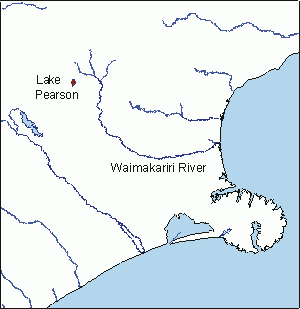Mackinaw (Salvelinus namaycush)

This member of the Salmonidae family occurs naturally throughout the north of the United States and in Canada and Alaska. A single importation of eggs occurred in 1906, and these fish were destined for Lake Kaniere on the west coast. However, when their transport ran into difficulties crossing Arthurs Pass, the fish were dumped into Lakes Grasmere and Pearson in the Waimakariri River catchment. Mackinaw have not thrived in New Zealand, and the only known population at present occurs in Lake Pearson.
In Lake Pearson, mackinaw co-exist with rainbow and brown trout. They can be distinguished from the trout species by the presence of pale yellow-green spots on the back and sides. The mouth is also very large and the caudal fin quite deeply forked.
Mackinaw are one of the few salmonid species that do not dig redds. It is believed that the adults use their tails to sweep mud and silt from gravels along the lakebed and that the eggs are then released over the clean gravels where they sink in among the rocks. Spawning probably occurs in April and May.
Overseas, mackinaw are known as a cold-water fish that generally live in deep lakes. It is therefore unusual that they survive in the small and shallow Lake Pearson. Known variously as lake trout, lake char and mackinaw, in their native waters mackinaw grow to a very large size – up to 46 kg in weight. In New Zealand they rarely exceed 1 kg in weight and are often in poor condition when caught, indicating that Lake Pearson is not ideal habitat for them. Due to their restricted distribution, small size, and sluggish response when hooked, mackinaw are not highly regarded by anglers in New Zealand.

